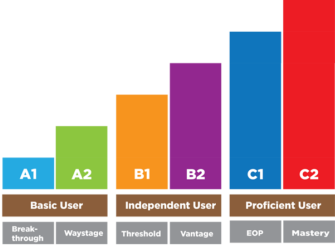Spanish Center

In 2013, UVM’s Spanish Center achieved accreditation as an Associated Center of the Cervantes Institute, at the moment, the only Center accredited in Chile.
Upon arrival at our center, students undergo both oral and written exams to assess their language proficiency. Depending on their scores, they become eligible to enroll in core Spanish classes and/or elective Spanish courses. Students with an advanced (C1) level of Spanish have the opportunity to enroll in classes offered by UVM Majors.
Academic Calendar:
Fall Semester: March to July.
Spring Semester: August to December
Our semester program is offered in both periods every year.
The Spanish Center uses the Common European Framework of Reference for Languages to place students in their appropriate levels of Spanish.
The CEFR levels are:

Regardless of their level, students can choose between the following core courses in Spanish.
The overall objective is to increase speaking and listening skills in Spanish from a communicative approach. Learning takes place through geography, history and culture of Chile. Students are given an overview of Chile allowing them to analyze, understand and compare a Hispanic country with their country of origin.
Contact Hours: 64.
Credits: 4.
ECTS: 5.
Levels: A1, A2, B1, B2.
Through various teaching techniques, students will be able to increase their speaking, listening, reading, and writing skills in Spanish. At the advanced level, students will learn how to redact professional documents such as e-mails, formal letters, and their resumes.
Contact Hours: 64.
Credits: 4.
ECTS: 5.
Levels: A1, A2, B1, B2.
This course focuses on the development of oral language skills to produce standard Spanish at every level. Students learn to analyze contrastive phonetic systems of Spanish and their native language to eliminate the interference of the latter.
Contact Hours: 64.
Credits: 4.
ECTS: 5.
Levels: A1, A2, B1, B2.
This course is divided in 2 parts: First part you will have basic Communicational Spanish and Chilean culture classes. The second part is focused on learning basic Mapudungún, the language of Mapuche people, you will have a deep understanding of their culture and worldview.
Contact Hours: 64.
Credits: 4.
ECTS: 5.
Levels: A1, A2, B1, B2.
*Please, be aware that the courses availability is subject to change as there is a minimum of 4 students per class required.
Students with an intermediate level of Spanish or higher (B1-B2), can choose among the following electives that are dictated in Spanish for international students.
This course will show how to compare the most significant linguistic varieties in the Hispanic world, reviewing the causes, development and main examples of the varieties of Spanish.
Contact Hours: 64.
Credits: 4.
ECTS: 5.
Spanish Level Required: B1,B2.
In this course, students will learn about Chile’s history from 1970 to current century and the effect of neoliberal model as an economic, social and cultural phenomenon. This will allow the students to have communicative exchanges and writings among them.
Contact Hours: 64.
Credits: 4.
ECTS: 5.
Spanish Level Required: B1.
This course reviews and explains the political, economic, cultural, and security of individual Latin American states, highlighting issues such as governance, political organization, production, markets, income distribution and intra-and interstate conflict. The course also examines the similarities and differences between the Latin American region, the United States, Europe, and Asia.
Contact Hours: 64.
Credits: 4.
ECTS: 5.
Spanish Level Required: B1.
This course introduces students to international and Chilean intercultural communication studies focusing on the origin of the cultures to achieve greater understanding of differences and similarities of each culture.
Contact Hours: 32.
Credits: 2.
ECTS: 3.
Spanish Level Required: B1.
Latin Americans seek their identity through art. This allows them to integrate a vision about themselves and their world. This course provides not only an historical, but also cultural and cinematographic approach to Latin America. Since each Latin American country has its own distinctive culture, cross-cultural issues can be seen in their cinema. The cinematic approach, therefore, will be multicultural in nature: it will include films made by artists from Chile, England, Germany, the Netherlands, and Spain. This multicultural perspective is favourable as it reveals through each of its depictions the notions of self and otherness in regards to Latin America.
Contact Hours: 64.
Credits: 4.
ECTS: 5.
Spanish Level Required: B1.
This course aims to give its students a thorough overview of Latin American literature, both narrative and poetry. From the mid-20th century onwards, authors such as Jorge Luis Borges, Gabriel García Márquez, and Pablo Neruda reinvigorated the Spanish language by scoping its presence within the Latin American identity and bringing its otherness into the Spanish speaking worldview. This linguistic revolution, however, was not based solely on the work of male authors. The Chilean writer Maria Luisa Bombal spearheaded a feminist narrative wave which articulated for the first time the desires and longing of the urban modern Latin American woman, through a female voice constantly silenced by the male-centered reality. Thus, this course’s thematic approach seeks to illustrate the creative richness within the Latin American worldview.
Contact Hours: 64.
Credits: 4.
ECTS: 5.
Spanish Level Required: B1.
In this course, students will learn about the history of Mapuche people, its culture and the current conflicts between the State, Chilean society and Mapuche people. This will allow the students to have communicative exchanges and writings among them.
Contact Hours: 64.
Credits: 4.
ECTS: 5.
Spanish Level Required: B1.
This course will allow the students to know more about Chile’s popular culture, its representation forms and the identity between the popular culture and mestizo people from the second part of XX century to the current century. This will allow the students to have communicative exchanges and writings among them.
Contact Hours: 64.
Credits: 4.
ECTS: 5.
Spanish Level Required: B1.
Students in this course will learn about the Latin America history through the study of revolutions and their forms of representation in society. This will allow the students to have communicative exchanges and writings among them.
Contact Hours: 64.
Credits: 4.
ECTS: 5.
Spanish Level Required: B1.
The objective of this course is to analyze collective action and social commitment in order to understand the special characteristics of Latin American mobilizations. Students will learn about various social movements, how a global justice discourse is developed along with how to evaluate various social problems. This course will provide the opportunity to question the notions of “revolution”, “citizenship” and “democracy.” Once students understand the basis of how social movements are created, they will learn to analyze contemporary issues that cut across Latin America.
Contact Hours: 64.
Credits: 4.
ECTS: 5.
Spanish Level Required: B1.
This course reviews and explains the political, economic, cultural and social aspects of Latin American states. It highlights issues of governance, political organization, production, markets, income distribution and interstate conflict. The course will also examine the similarities and differences between the Latin American region and the world.
Contact Hours: 64.
Credits: 4.
ECTS: 5.
Spanish Level Required: B1.
*Please, be aware that the courses availability is subject to change as there is a minimum of 4 students per class required.
No previous knowledge of Spanish is required for students to participate in the Spanish Center classes, as we offer courses starting from the beginner level. The UVM respects the home university’s requirements regarding the maximum and minimum courses a student should take while abroad.
We invite all students to talk with their academic advisors in their home universities about how many credits they should take while studying with the UVM in order to maintain their full-time student status. International students should also speak with their advisors to understand how their grades and credits will transfer back.
Students contribute to the local community through volunteering at an NGO or Non-profit organization associated with the University.
The objectives of our Volunteer Program for International Students are:
Commitment:
Educational, sports, and tourism organization comprised of expert professionals in the field of physical activity and modern sports. They promote sports and recreational activities among children, youth, and adults in the Valparaíso Region combining outdoor sports practice with environmental education. They promote water sports such as adapted surfing and social surfing, ensuring access to sports for people with disabilities and social vulnerability. The focus of volunteering includes:
The aim is to collaborate with academia in various activities.
Previous surfing experience is not required as they provide training. The volunteering takes place at La Boca Beach in Concón.
Web Site: https://www.freesport.cl/
IG: @academiafreesport
Facebook: https://www.facebook.com/freesportconcon
CIDEMAR Foundation is a non-profit non-governmental organization with the mission of contributing to the conservation of aquatic ecosystems through science, education, and water sports.
These three tools contribute to the appreciation of aquatic life and critical habitats through awareness-raising efforts and the invitation for everyone to protect life through action. The lines of action cover three aspects:
The volunteering objectives in Viña del Mar are:
Web Site: http://www.cidemar.com/
IG: @fundacioncidemar
Facebook: https://www.facebook.com/FCIDEMAR/
Organization that uses surfing as a tool to encourage the following:
Address: 101 Garibaldi, Cerro La Cruz, Valparaíso: https://goo.gl/maps/PJrSq6Yyt2N2
Once you apply, at the end of the application period, we will send you:
An email informing you of the availability of the selected courses and, if there are any changes, a deadline for your confirmation.
Once we receive your confirmation, we will send you the program invoice (if applicable) along with payment instructions and general program information. Remember that you can download the refund procedure, available on the main page of the Spanish Center. This document will also be sent along with the invoice.
If you need to pay for the program, once your payment is received, we will send you the official acceptance letter to the program, including the academic calendar and relevant information to help you prepare for your trip to Chile.
We invite you to review the Student Guide to prepare for your stay with us.
For any questions, inquiries, suggestions, or complaints, you can always contact us at [email protected]. Do not hesitate to reach out—your feedback is very important to us.
Apply Here